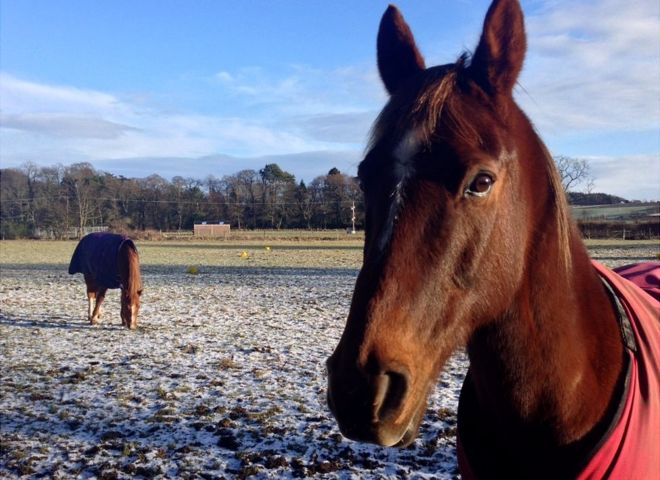- 54 minutes ago
- Science & Environment
출처: http://www.bbc.com/news/science-environment-35522233
Horses recognise human emotions
 Victoria Gill/BBC
Victoria Gill/BBCHorses are able to discriminate between happy and angry human facial expressions, according to research.
In an experiment using photographs of male human faces, scientists from the University of Sussex showed that domestic horses "responded negatively" to angry expressions.
The scientists say domestication may have enabled horses to adapt to and interpret human behaviour.
The findings are published in the journal Biology Letters.
The team carried out their tests at riding stables - presenting large photographs to a total of 28 horses.
one person presents the photo while another holds the horse," explained researcher Amy Smith.
 Royal Society Biology Letter
Royal Society Biology Letter"The main result," she explained, "was that they looked [at angry faces] with their left eye."
Mammal brains are wired such that input from the left eye is processed by the right side of the brain.
"The right hemisphere is specialised for processing negative stimuli," explained Miss Smith. "It's really about the partition of energy - not using the whole brain."
The researchers also fitted the horses with heart monitors, which revealed that angry faces caused their heart rates to rise significantly.
Similar results have been reported recently in domestic dogs, raising questions about how living with humans might have influenced animals' abilities.
While horses might have an innate ability to recognise emotions in each other, their domestication by humans could have caused them to adapt that ability to humans.
"It also shows this extra ability of horses," said Miss Smith. "[It shows that] our behaviour around them has an impact."
'과학과 테크놀로지 > 과학' 카테고리의 다른 글
| (과학) 숫자는 중력파를 정확히 보여주지 않는다 (0) | 2016.02.12 |
|---|---|
| (과학) 아인슈타인의 중력파 관측되다 (0) | 2016.02.12 |
| (과학) 주름진 뇌의 물리현상이 유리 안에서 재현되다 (0) | 2016.02.03 |
| (과학) 천문학자들 최대 태양계 발견 (0) | 2016.01.29 |
| (과학) 은하계 역사를 추적하는 '연대 지도' (0) | 2016.01.10 |